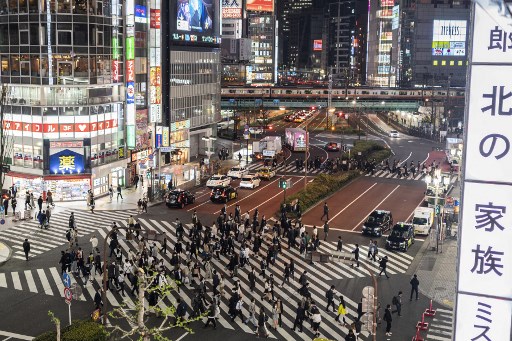
TOKYO, Japan (AFP) — Tokyo will lift curbs on bar and restaurant opening hours as virus cases in the Japanese capital hit their lowest level this year, officials said Thursday.
It is the latest softening of virus restrictions in Japan, where cases have been in freefall for weeks, which experts ascribe to a rapid increase in the vaccination rate.
Nationwide, new infections have plunged from record highs of over 25,800 in August to under 400 in recent days.
And Tokyo, a city of 14 million people, has reported an average of 47 daily cases over the past week — lows not seen since June 2020.
The country has never imposed a blanket lockdown, but for most of this year a virus state of emergency was in place in major cities and other areas, targeting alcohol sales and crowd sizes at large events — including the Tokyo Olympics, held mostly behind closed doors.
The emergency measures ended three weeks ago, but some restrictions have remained, including Tokyo’s restaurants and bars being asked to close by 9 pm.
From Monday, establishments in the capital that take sufficient anti-infection measures will be free to open late, Tokyo governor Yuriko Koike said, after surrounding regions announced similar steps.
“Vaccination has been making great progress. We have seen cooperation with anti-infection measures. As a result, infections have been rapidly contained,” she said at a meeting of city officials.
Although Japan’s vaccine drive started later than in many other developed economies, around 68 percent of the population are now fully inoculated — more than the United States’ 57 percent.
The borders of the world’s third largest economy remain shut to almost all foreign nationals, and mask-wearing is not mandatory but ubiquitous in public places.
However, experts urged people not to drop their guard, as signs of a rebound in new infections emerge in the nation’s colder northern areas.
“Foreign countries that led the way in vaccination programmes dramatically eased restrictions and saw rebounds (in new cases),” a panel of infectious disease experts who advise the government said in a recent document.
Japan will hold general elections on October 31, with new Prime Minister Fumio Kishida widely expected to hold power.
His predecessor Yoshihide Suga stepped down earlier this month after his popularity ratings plummeted, partly over the government’s virus response.
© Agence France-Presse








